ENMM20025: Maintenance Strategies Report for Elphinstone Engineering
VerifiedAdded on 2020/11/23
|21
|5347
|218
Report
AI Summary
This report provides a comprehensive analysis of the maintenance strategies employed by Elphinstone Engineering, focusing on the management of its assets, particularly the gearbox. It begins with an executive summary and introduction, followed by a detailed examination of the company's process flow diagram and asset inventory, including the operating characteristics and production policy of the gearbox. The report then outlines the unit life plan for maintenance tasks and the needs for spare parts. Furthermore, it delves into the optimization process for determining preventive maintenance (PM) methodology for the gearbox, including a discussion of FRACAS. The report also analyzes the current PM schedule, evaluates and optimizes it, and provides a comparison of the previous and optimized schedules. Finally, the report discusses the application of lean principles within maintenance strategies, including a root cause analysis of an asset. The report concludes with a summary of findings and references.
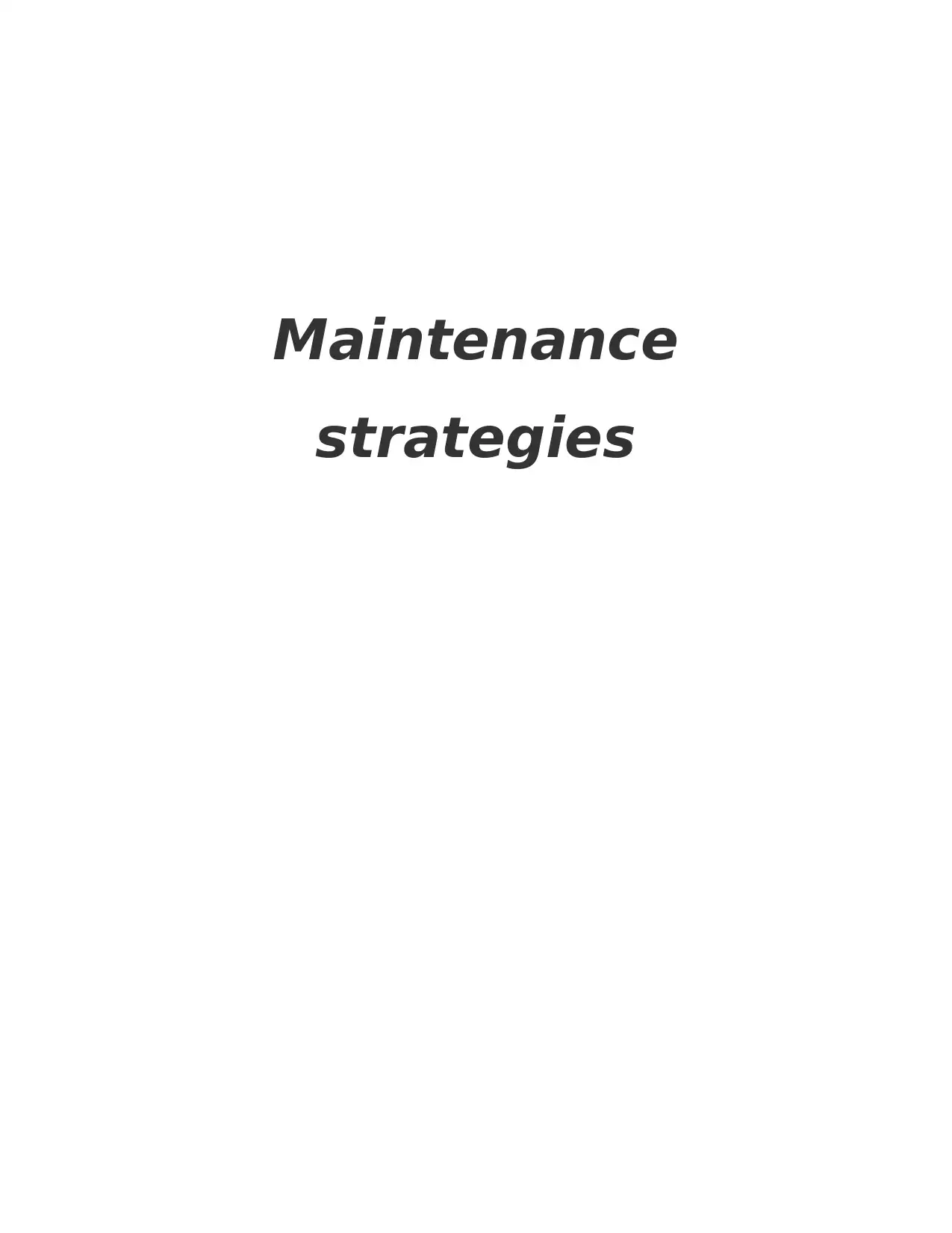
Maintenance
strategies
strategies
Paraphrase This Document
Need a fresh take? Get an instant paraphrase of this document with our AI Paraphraser
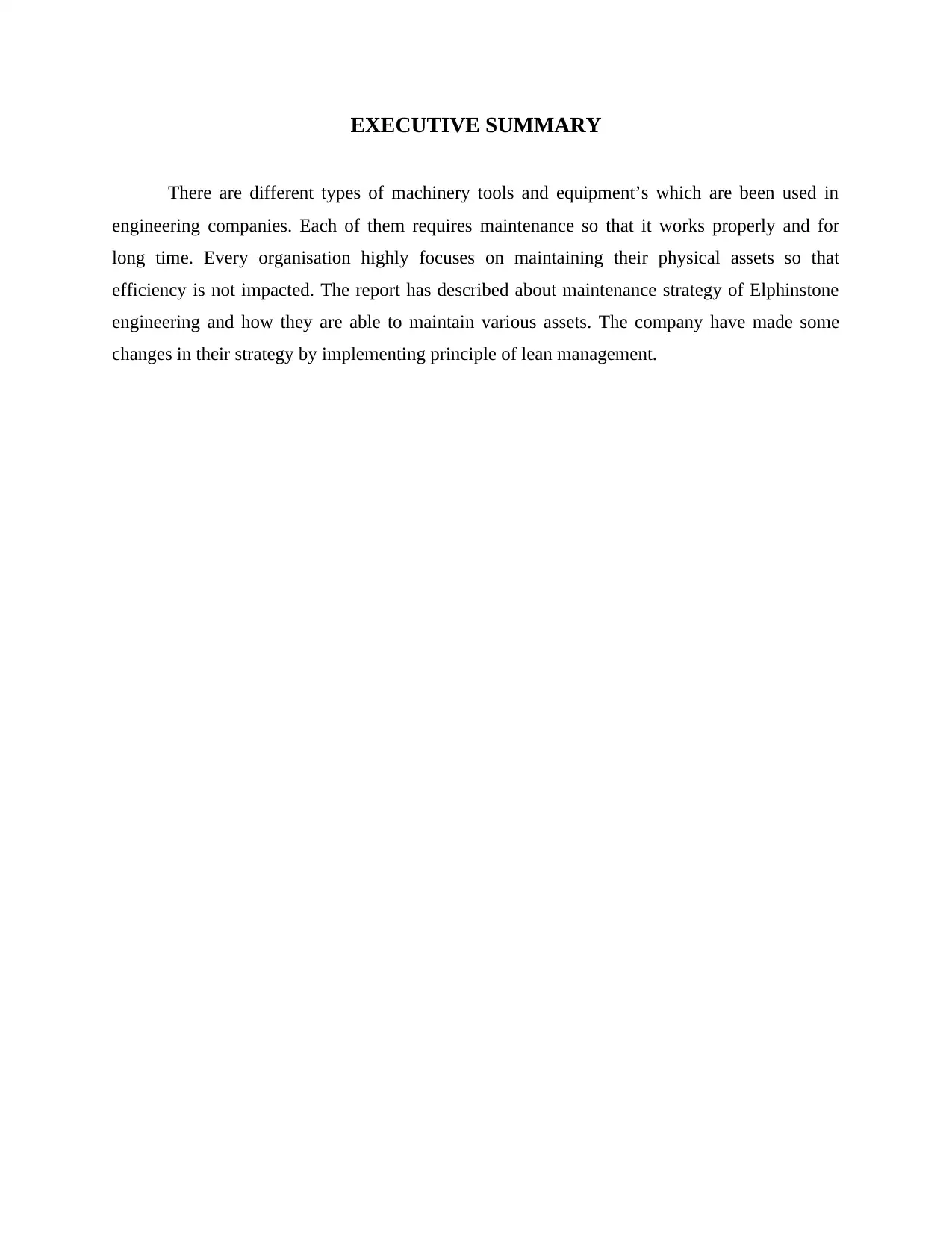
EXECUTIVE SUMMARY
There are different types of machinery tools and equipment’s which are been used in
engineering companies. Each of them requires maintenance so that it works properly and for
long time. Every organisation highly focuses on maintaining their physical assets so that
efficiency is not impacted. The report has described about maintenance strategy of Elphinstone
engineering and how they are able to maintain various assets. The company have made some
changes in their strategy by implementing principle of lean management.
There are different types of machinery tools and equipment’s which are been used in
engineering companies. Each of them requires maintenance so that it works properly and for
long time. Every organisation highly focuses on maintaining their physical assets so that
efficiency is not impacted. The report has described about maintenance strategy of Elphinstone
engineering and how they are able to maintain various assets. The company have made some
changes in their strategy by implementing principle of lean management.
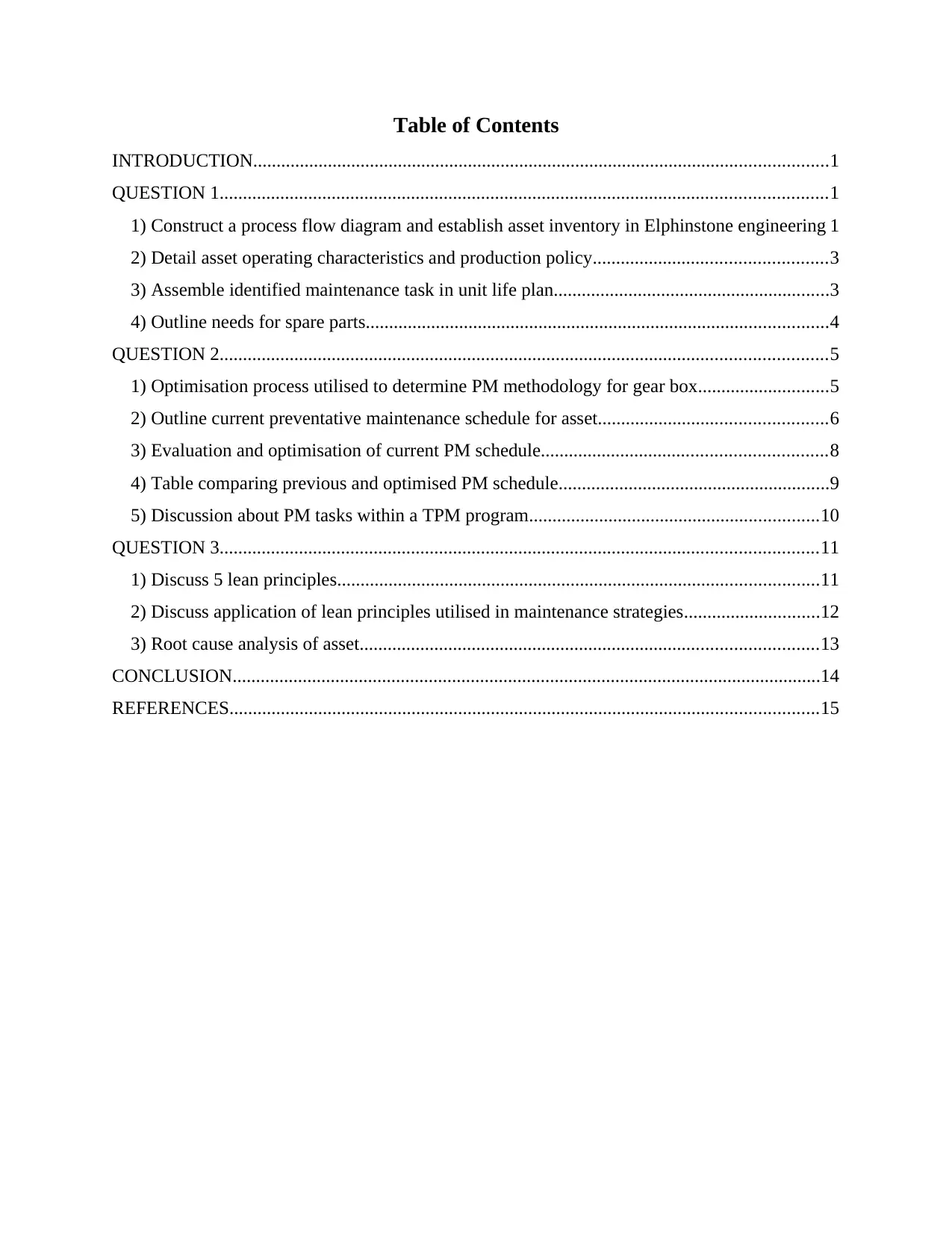
Table of Contents
INTRODUCTION...........................................................................................................................1
QUESTION 1..................................................................................................................................1
1) Construct a process flow diagram and establish asset inventory in Elphinstone engineering 1
2) Detail asset operating characteristics and production policy..................................................3
3) Assemble identified maintenance task in unit life plan...........................................................3
4) Outline needs for spare parts...................................................................................................4
QUESTION 2..................................................................................................................................5
1) Optimisation process utilised to determine PM methodology for gear box............................5
2) Outline current preventative maintenance schedule for asset.................................................6
3) Evaluation and optimisation of current PM schedule.............................................................8
4) Table comparing previous and optimised PM schedule..........................................................9
5) Discussion about PM tasks within a TPM program..............................................................10
QUESTION 3................................................................................................................................11
1) Discuss 5 lean principles.......................................................................................................11
2) Discuss application of lean principles utilised in maintenance strategies.............................12
3) Root cause analysis of asset..................................................................................................13
CONCLUSION..............................................................................................................................14
REFERENCES..............................................................................................................................15
INTRODUCTION...........................................................................................................................1
QUESTION 1..................................................................................................................................1
1) Construct a process flow diagram and establish asset inventory in Elphinstone engineering 1
2) Detail asset operating characteristics and production policy..................................................3
3) Assemble identified maintenance task in unit life plan...........................................................3
4) Outline needs for spare parts...................................................................................................4
QUESTION 2..................................................................................................................................5
1) Optimisation process utilised to determine PM methodology for gear box............................5
2) Outline current preventative maintenance schedule for asset.................................................6
3) Evaluation and optimisation of current PM schedule.............................................................8
4) Table comparing previous and optimised PM schedule..........................................................9
5) Discussion about PM tasks within a TPM program..............................................................10
QUESTION 3................................................................................................................................11
1) Discuss 5 lean principles.......................................................................................................11
2) Discuss application of lean principles utilised in maintenance strategies.............................12
3) Root cause analysis of asset..................................................................................................13
CONCLUSION..............................................................................................................................14
REFERENCES..............................................................................................................................15
⊘ This is a preview!⊘
Do you want full access?
Subscribe today to unlock all pages.

Trusted by 1+ million students worldwide
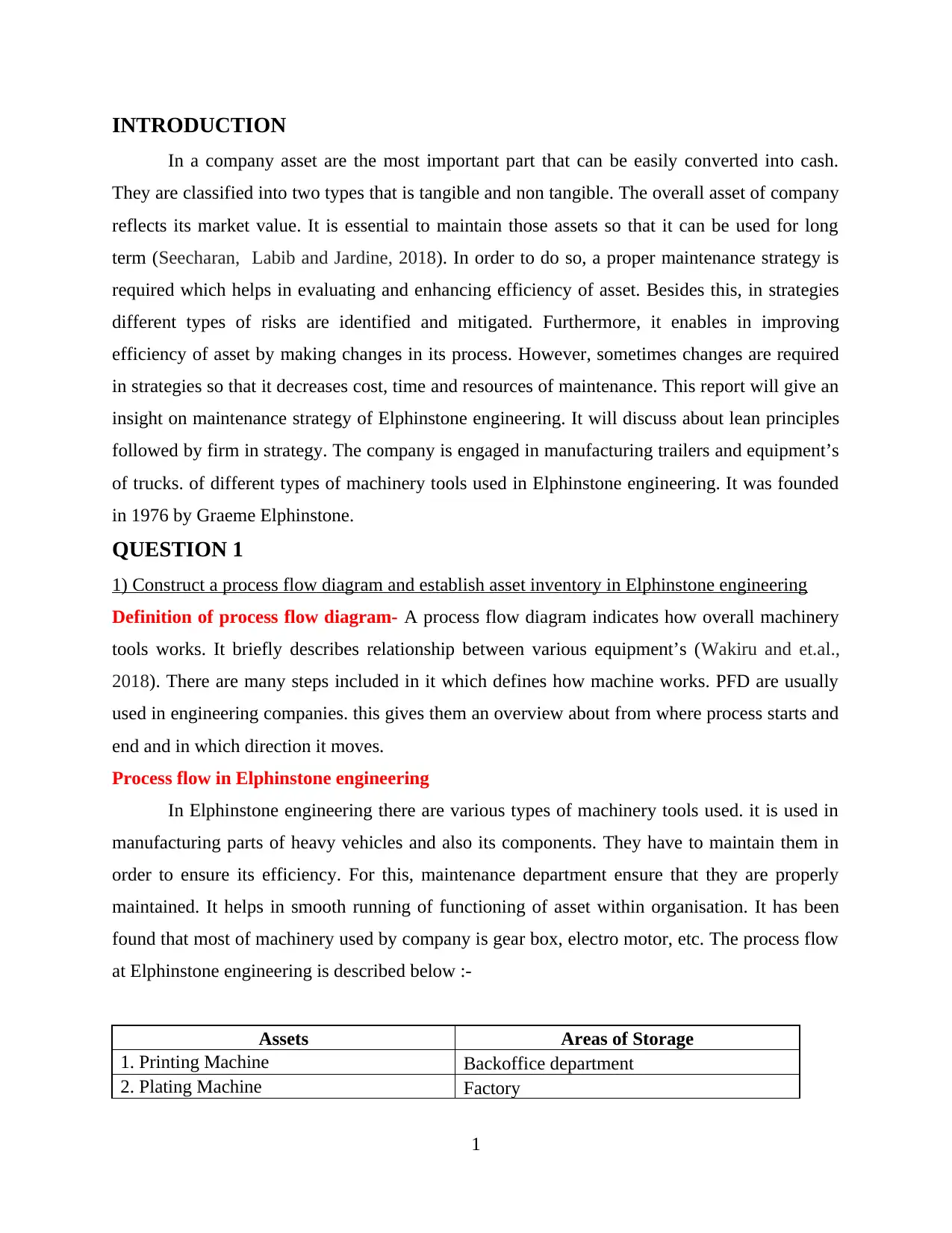
INTRODUCTION
In a company asset are the most important part that can be easily converted into cash.
They are classified into two types that is tangible and non tangible. The overall asset of company
reflects its market value. It is essential to maintain those assets so that it can be used for long
term (Seecharan, Labib and Jardine, 2018). In order to do so, a proper maintenance strategy is
required which helps in evaluating and enhancing efficiency of asset. Besides this, in strategies
different types of risks are identified and mitigated. Furthermore, it enables in improving
efficiency of asset by making changes in its process. However, sometimes changes are required
in strategies so that it decreases cost, time and resources of maintenance. This report will give an
insight on maintenance strategy of Elphinstone engineering. It will discuss about lean principles
followed by firm in strategy. The company is engaged in manufacturing trailers and equipment’s
of trucks. of different types of machinery tools used in Elphinstone engineering. It was founded
in 1976 by Graeme Elphinstone.
QUESTION 1
1) Construct a process flow diagram and establish asset inventory in Elphinstone engineering
Definition of process flow diagram- A process flow diagram indicates how overall machinery
tools works. It briefly describes relationship between various equipment’s (Wakiru and et.al.,
2018). There are many steps included in it which defines how machine works. PFD are usually
used in engineering companies. this gives them an overview about from where process starts and
end and in which direction it moves.
Process flow in Elphinstone engineering
In Elphinstone engineering there are various types of machinery tools used. it is used in
manufacturing parts of heavy vehicles and also its components. They have to maintain them in
order to ensure its efficiency. For this, maintenance department ensure that they are properly
maintained. It helps in smooth running of functioning of asset within organisation. It has been
found that most of machinery used by company is gear box, electro motor, etc. The process flow
at Elphinstone engineering is described below :-
Assets Areas of Storage
1. Printing Machine Backoffice department
2. Plating Machine Factory
1
In a company asset are the most important part that can be easily converted into cash.
They are classified into two types that is tangible and non tangible. The overall asset of company
reflects its market value. It is essential to maintain those assets so that it can be used for long
term (Seecharan, Labib and Jardine, 2018). In order to do so, a proper maintenance strategy is
required which helps in evaluating and enhancing efficiency of asset. Besides this, in strategies
different types of risks are identified and mitigated. Furthermore, it enables in improving
efficiency of asset by making changes in its process. However, sometimes changes are required
in strategies so that it decreases cost, time and resources of maintenance. This report will give an
insight on maintenance strategy of Elphinstone engineering. It will discuss about lean principles
followed by firm in strategy. The company is engaged in manufacturing trailers and equipment’s
of trucks. of different types of machinery tools used in Elphinstone engineering. It was founded
in 1976 by Graeme Elphinstone.
QUESTION 1
1) Construct a process flow diagram and establish asset inventory in Elphinstone engineering
Definition of process flow diagram- A process flow diagram indicates how overall machinery
tools works. It briefly describes relationship between various equipment’s (Wakiru and et.al.,
2018). There are many steps included in it which defines how machine works. PFD are usually
used in engineering companies. this gives them an overview about from where process starts and
end and in which direction it moves.
Process flow in Elphinstone engineering
In Elphinstone engineering there are various types of machinery tools used. it is used in
manufacturing parts of heavy vehicles and also its components. They have to maintain them in
order to ensure its efficiency. For this, maintenance department ensure that they are properly
maintained. It helps in smooth running of functioning of asset within organisation. It has been
found that most of machinery used by company is gear box, electro motor, etc. The process flow
at Elphinstone engineering is described below :-
Assets Areas of Storage
1. Printing Machine Backoffice department
2. Plating Machine Factory
1
Paraphrase This Document
Need a fresh take? Get an instant paraphrase of this document with our AI Paraphraser
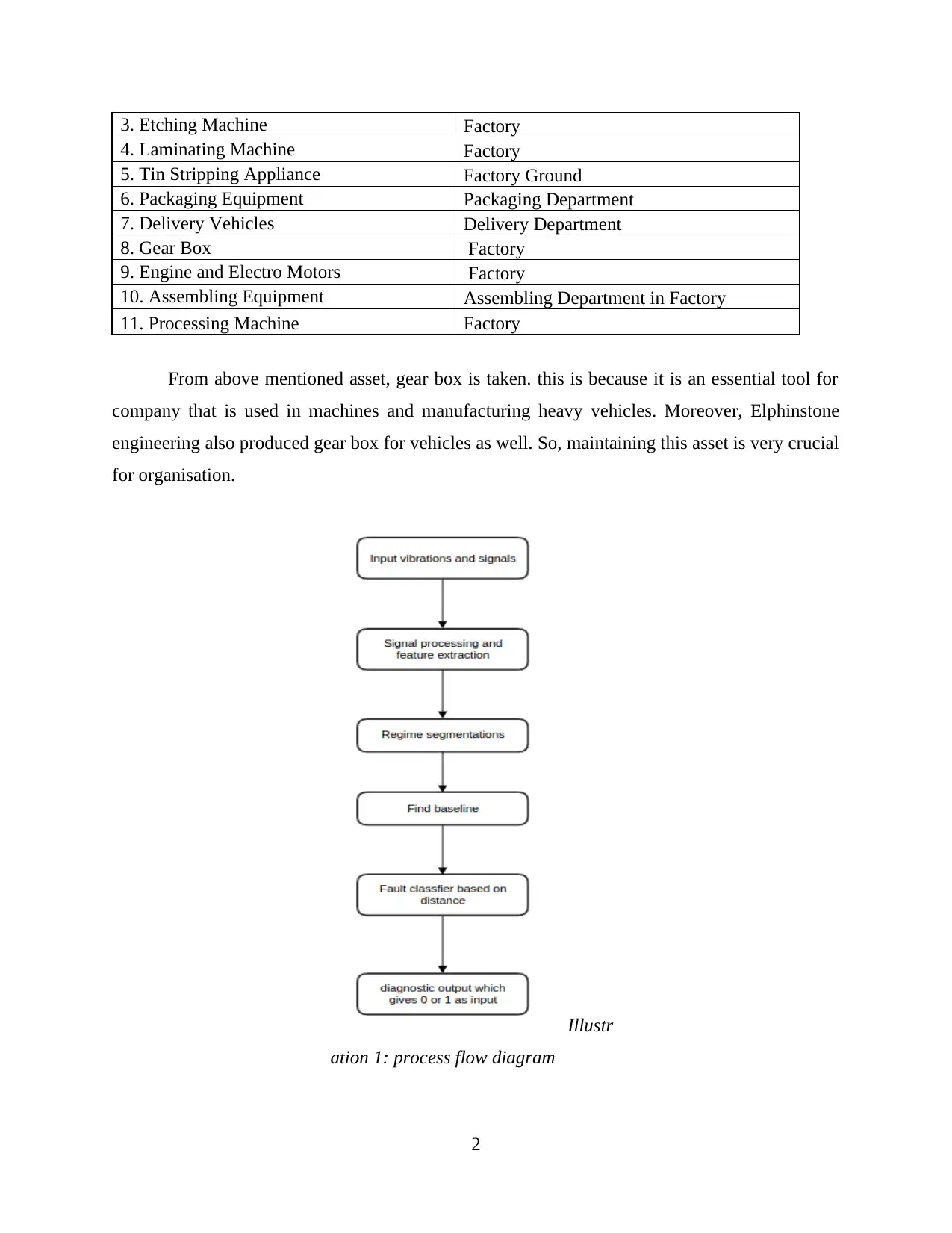
3. Etching Machine Factory
4. Laminating Machine Factory
5. Tin Stripping Appliance Factory Ground
6. Packaging Equipment Packaging Department
7. Delivery Vehicles Delivery Department
8. Gear Box Factory
9. Engine and Electro Motors Factory
10. Assembling Equipment Assembling Department in Factory
11. Processing Machine Factory
From above mentioned asset, gear box is taken. this is because it is an essential tool for
company that is used in machines and manufacturing heavy vehicles. Moreover, Elphinstone
engineering also produced gear box for vehicles as well. So, maintaining this asset is very crucial
for organisation.
2
Illustr
ation 1: process flow diagram
4. Laminating Machine Factory
5. Tin Stripping Appliance Factory Ground
6. Packaging Equipment Packaging Department
7. Delivery Vehicles Delivery Department
8. Gear Box Factory
9. Engine and Electro Motors Factory
10. Assembling Equipment Assembling Department in Factory
11. Processing Machine Factory
From above mentioned asset, gear box is taken. this is because it is an essential tool for
company that is used in machines and manufacturing heavy vehicles. Moreover, Elphinstone
engineering also produced gear box for vehicles as well. So, maintaining this asset is very crucial
for organisation.
2
Illustr
ation 1: process flow diagram
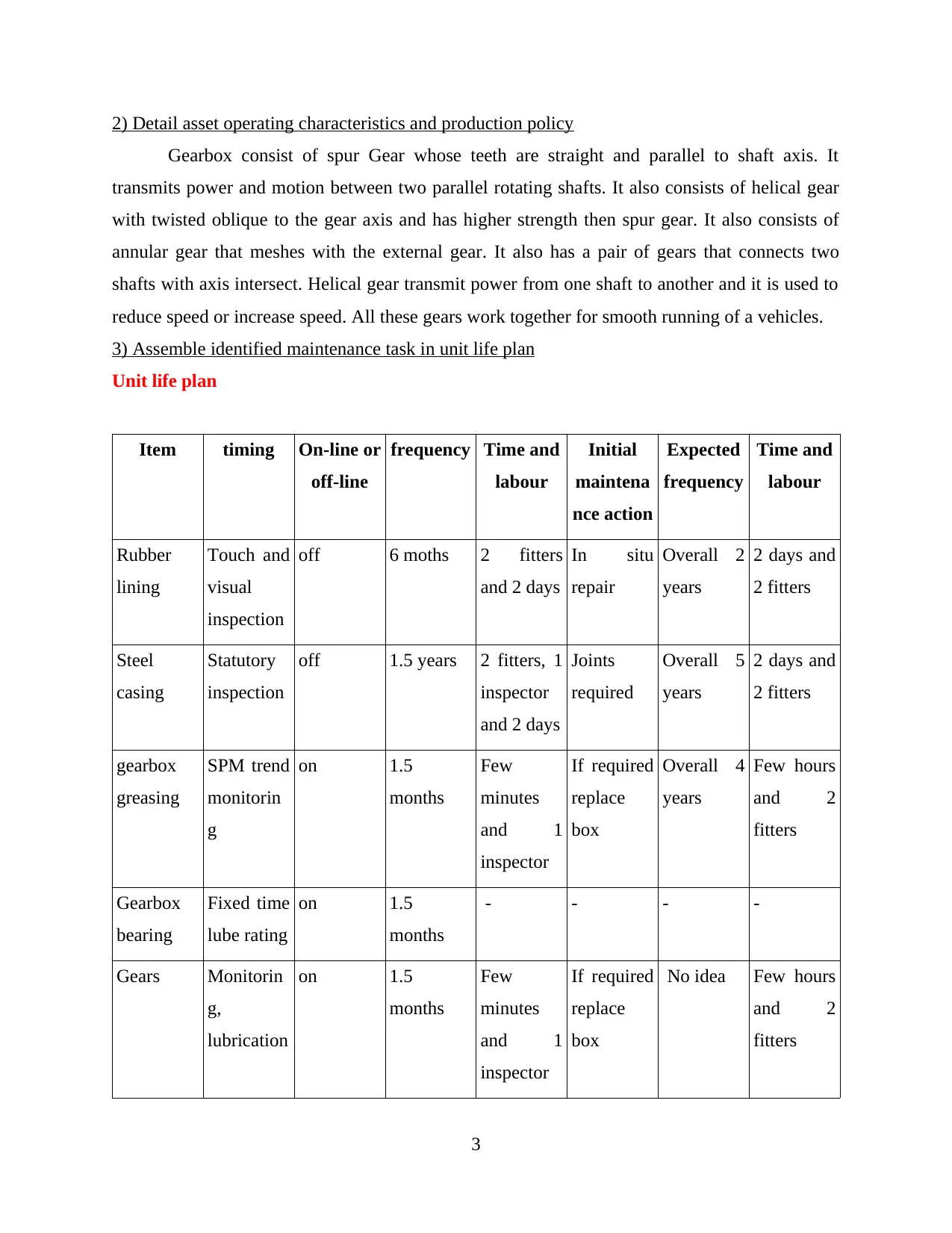
2) Detail asset operating characteristics and production policy
Gearbox consist of spur Gear whose teeth are straight and parallel to shaft axis. It
transmits power and motion between two parallel rotating shafts. It also consists of helical gear
with twisted oblique to the gear axis and has higher strength then spur gear. It also consists of
annular gear that meshes with the external gear. It also has a pair of gears that connects two
shafts with axis intersect. Helical gear transmit power from one shaft to another and it is used to
reduce speed or increase speed. All these gears work together for smooth running of a vehicles.
3) Assemble identified maintenance task in unit life plan
Unit life plan
Item timing On-line or
off-line
frequency Time and
labour
Initial
maintena
nce action
Expected
frequency
Time and
labour
Rubber
lining
Touch and
visual
inspection
off 6 moths 2 fitters
and 2 days
In situ
repair
Overall 2
years
2 days and
2 fitters
Steel
casing
Statutory
inspection
off 1.5 years 2 fitters, 1
inspector
and 2 days
Joints
required
Overall 5
years
2 days and
2 fitters
gearbox
greasing
SPM trend
monitorin
g
on 1.5
months
Few
minutes
and 1
inspector
If required
replace
box
Overall 4
years
Few hours
and 2
fitters
Gearbox
bearing
Fixed time
lube rating
on 1.5
months
- - - -
Gears Monitorin
g,
lubrication
on 1.5
months
Few
minutes
and 1
inspector
If required
replace
box
No idea Few hours
and 2
fitters
3
Gearbox consist of spur Gear whose teeth are straight and parallel to shaft axis. It
transmits power and motion between two parallel rotating shafts. It also consists of helical gear
with twisted oblique to the gear axis and has higher strength then spur gear. It also consists of
annular gear that meshes with the external gear. It also has a pair of gears that connects two
shafts with axis intersect. Helical gear transmit power from one shaft to another and it is used to
reduce speed or increase speed. All these gears work together for smooth running of a vehicles.
3) Assemble identified maintenance task in unit life plan
Unit life plan
Item timing On-line or
off-line
frequency Time and
labour
Initial
maintena
nce action
Expected
frequency
Time and
labour
Rubber
lining
Touch and
visual
inspection
off 6 moths 2 fitters
and 2 days
In situ
repair
Overall 2
years
2 days and
2 fitters
Steel
casing
Statutory
inspection
off 1.5 years 2 fitters, 1
inspector
and 2 days
Joints
required
Overall 5
years
2 days and
2 fitters
gearbox
greasing
SPM trend
monitorin
g
on 1.5
months
Few
minutes
and 1
inspector
If required
replace
box
Overall 4
years
Few hours
and 2
fitters
Gearbox
bearing
Fixed time
lube rating
on 1.5
months
- - - -
Gears Monitorin
g,
lubrication
on 1.5
months
Few
minutes
and 1
inspector
If required
replace
box
No idea Few hours
and 2
fitters
3
⊘ This is a preview!⊘
Do you want full access?
Subscribe today to unlock all pages.

Trusted by 1+ million students worldwide
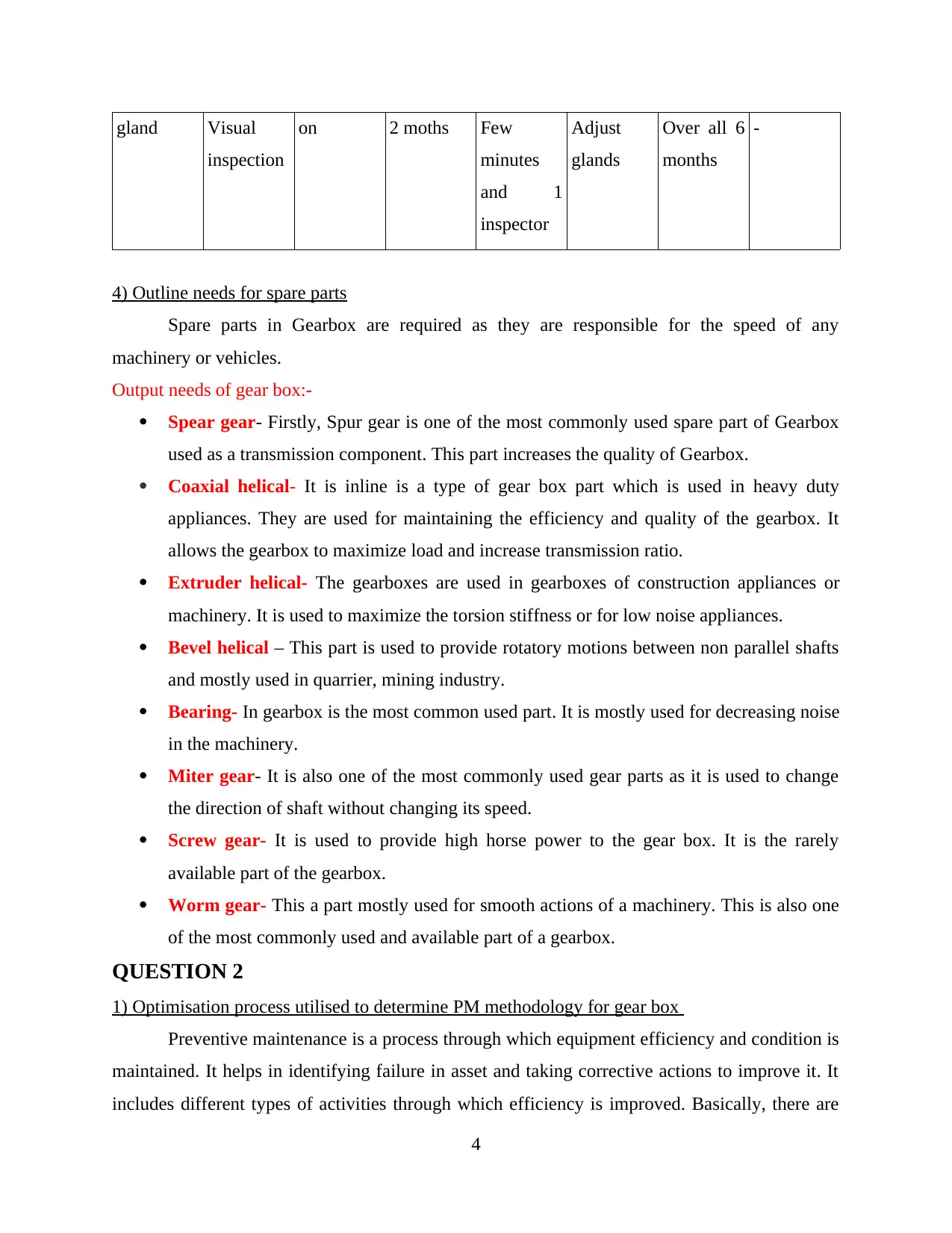
gland Visual
inspection
on 2 moths Few
minutes
and 1
inspector
Adjust
glands
Over all 6
months
-
4) Outline needs for spare parts
Spare parts in Gearbox are required as they are responsible for the speed of any
machinery or vehicles.
Output needs of gear box:-
Spear gear- Firstly, Spur gear is one of the most commonly used spare part of Gearbox
used as a transmission component. This part increases the quality of Gearbox.
Coaxial helical- It is inline is a type of gear box part which is used in heavy duty
appliances. They are used for maintaining the efficiency and quality of the gearbox. It
allows the gearbox to maximize load and increase transmission ratio.
Extruder helical- The gearboxes are used in gearboxes of construction appliances or
machinery. It is used to maximize the torsion stiffness or for low noise appliances.
Bevel helical – This part is used to provide rotatory motions between non parallel shafts
and mostly used in quarrier, mining industry.
Bearing- In gearbox is the most common used part. It is mostly used for decreasing noise
in the machinery.
Miter gear- It is also one of the most commonly used gear parts as it is used to change
the direction of shaft without changing its speed.
Screw gear- It is used to provide high horse power to the gear box. It is the rarely
available part of the gearbox.
Worm gear- This a part mostly used for smooth actions of a machinery. This is also one
of the most commonly used and available part of a gearbox.
QUESTION 2
1) Optimisation process utilised to determine PM methodology for gear box
Preventive maintenance is a process through which equipment efficiency and condition is
maintained. It helps in identifying failure in asset and taking corrective actions to improve it. It
includes different types of activities through which efficiency is improved. Basically, there are
4
inspection
on 2 moths Few
minutes
and 1
inspector
Adjust
glands
Over all 6
months
-
4) Outline needs for spare parts
Spare parts in Gearbox are required as they are responsible for the speed of any
machinery or vehicles.
Output needs of gear box:-
Spear gear- Firstly, Spur gear is one of the most commonly used spare part of Gearbox
used as a transmission component. This part increases the quality of Gearbox.
Coaxial helical- It is inline is a type of gear box part which is used in heavy duty
appliances. They are used for maintaining the efficiency and quality of the gearbox. It
allows the gearbox to maximize load and increase transmission ratio.
Extruder helical- The gearboxes are used in gearboxes of construction appliances or
machinery. It is used to maximize the torsion stiffness or for low noise appliances.
Bevel helical – This part is used to provide rotatory motions between non parallel shafts
and mostly used in quarrier, mining industry.
Bearing- In gearbox is the most common used part. It is mostly used for decreasing noise
in the machinery.
Miter gear- It is also one of the most commonly used gear parts as it is used to change
the direction of shaft without changing its speed.
Screw gear- It is used to provide high horse power to the gear box. It is the rarely
available part of the gearbox.
Worm gear- This a part mostly used for smooth actions of a machinery. This is also one
of the most commonly used and available part of a gearbox.
QUESTION 2
1) Optimisation process utilised to determine PM methodology for gear box
Preventive maintenance is a process through which equipment efficiency and condition is
maintained. It helps in identifying failure in asset and taking corrective actions to improve it. It
includes different types of activities through which efficiency is improved. Basically, there are
4
Paraphrase This Document
Need a fresh take? Get an instant paraphrase of this document with our AI Paraphraser
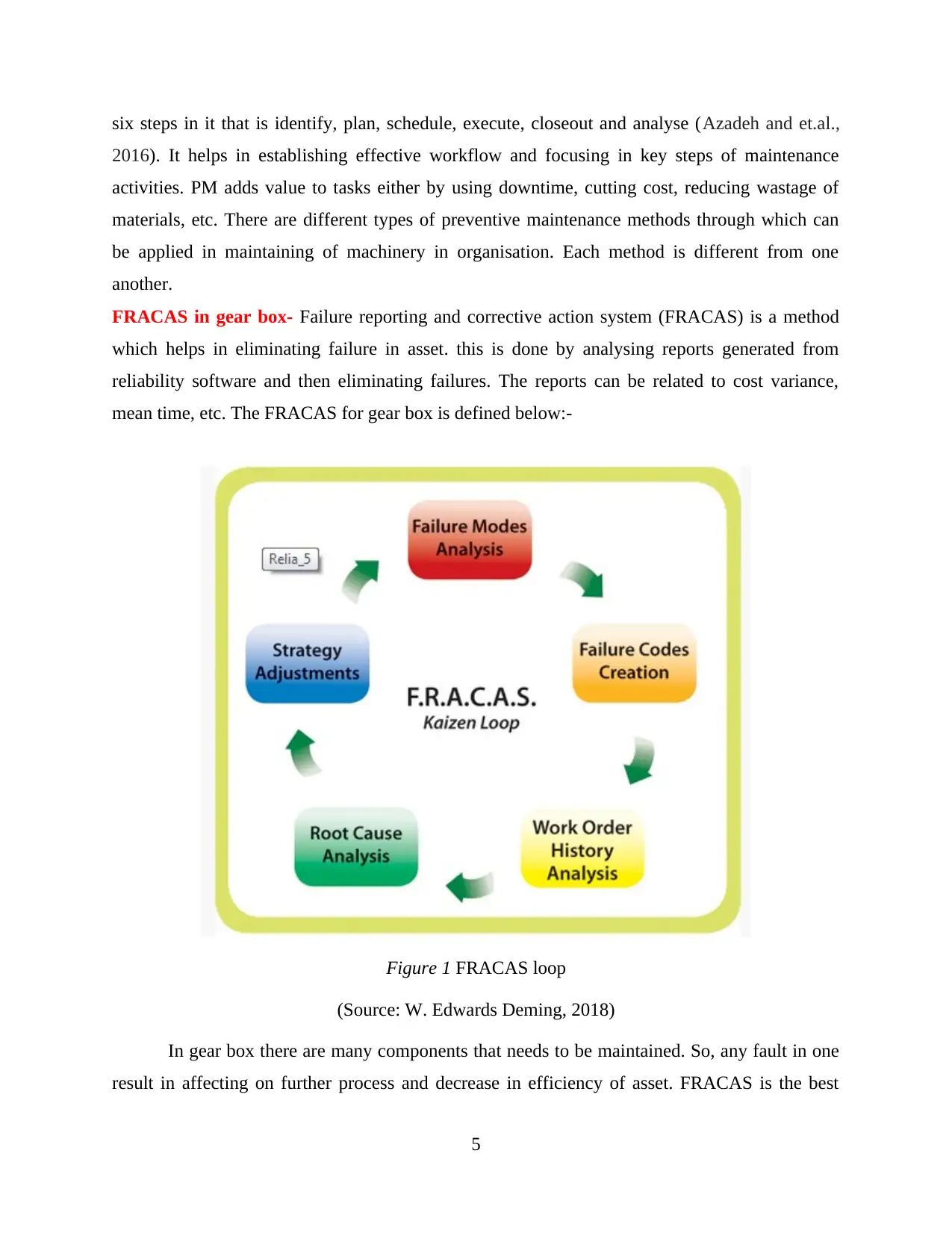
six steps in it that is identify, plan, schedule, execute, closeout and analyse (Azadeh and et.al.,
2016). It helps in establishing effective workflow and focusing in key steps of maintenance
activities. PM adds value to tasks either by using downtime, cutting cost, reducing wastage of
materials, etc. There are different types of preventive maintenance methods through which can
be applied in maintaining of machinery in organisation. Each method is different from one
another.
FRACAS in gear box- Failure reporting and corrective action system (FRACAS) is a method
which helps in eliminating failure in asset. this is done by analysing reports generated from
reliability software and then eliminating failures. The reports can be related to cost variance,
mean time, etc. The FRACAS for gear box is defined below:-
Figure 1 FRACAS loop
(Source: W. Edwards Deming, 2018)
In gear box there are many components that needs to be maintained. So, any fault in one
result in affecting on further process and decrease in efficiency of asset. FRACAS is the best
5
2016). It helps in establishing effective workflow and focusing in key steps of maintenance
activities. PM adds value to tasks either by using downtime, cutting cost, reducing wastage of
materials, etc. There are different types of preventive maintenance methods through which can
be applied in maintaining of machinery in organisation. Each method is different from one
another.
FRACAS in gear box- Failure reporting and corrective action system (FRACAS) is a method
which helps in eliminating failure in asset. this is done by analysing reports generated from
reliability software and then eliminating failures. The reports can be related to cost variance,
mean time, etc. The FRACAS for gear box is defined below:-
Figure 1 FRACAS loop
(Source: W. Edwards Deming, 2018)
In gear box there are many components that needs to be maintained. So, any fault in one
result in affecting on further process and decrease in efficiency of asset. FRACAS is the best
5
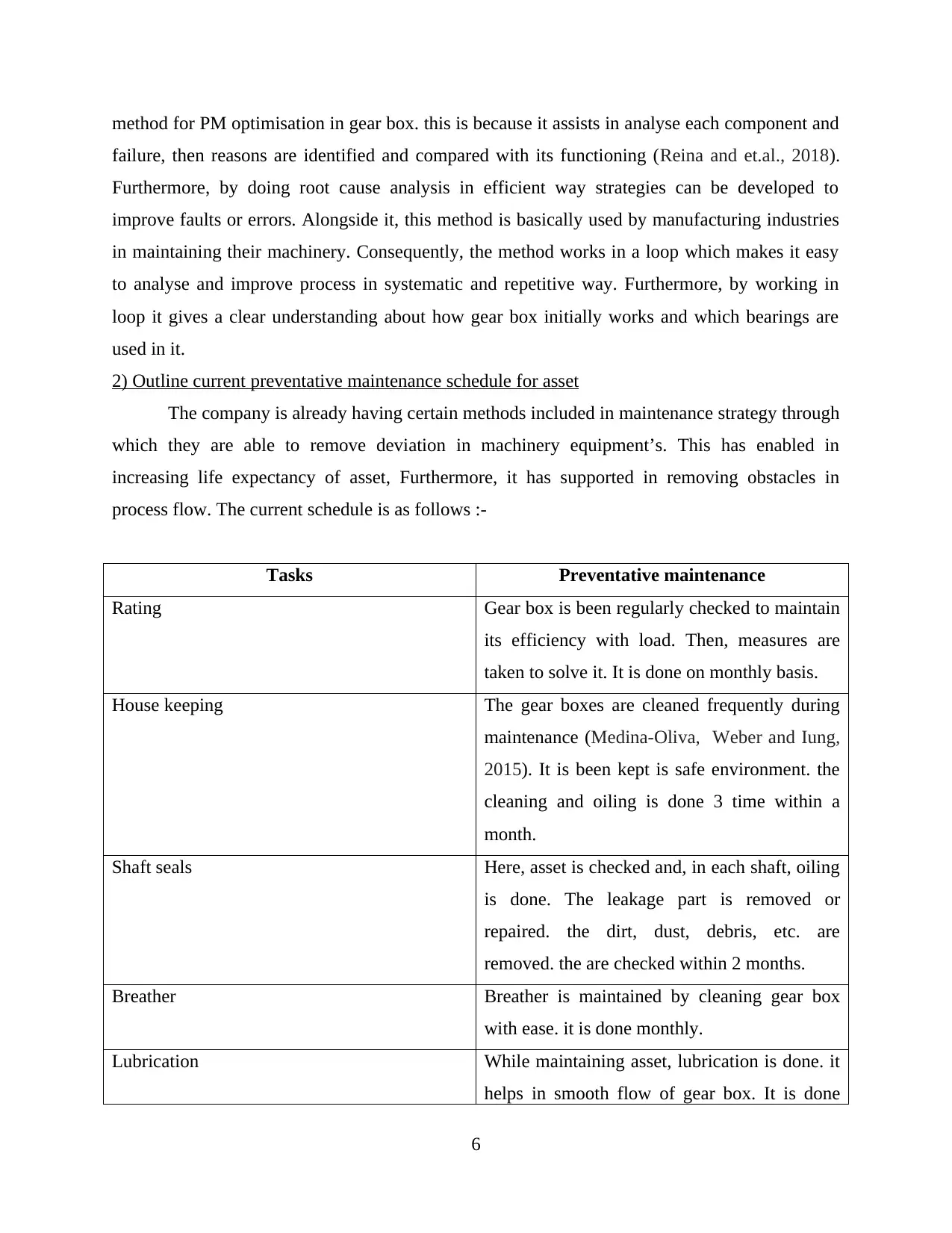
method for PM optimisation in gear box. this is because it assists in analyse each component and
failure, then reasons are identified and compared with its functioning (Reina and et.al., 2018).
Furthermore, by doing root cause analysis in efficient way strategies can be developed to
improve faults or errors. Alongside it, this method is basically used by manufacturing industries
in maintaining their machinery. Consequently, the method works in a loop which makes it easy
to analyse and improve process in systematic and repetitive way. Furthermore, by working in
loop it gives a clear understanding about how gear box initially works and which bearings are
used in it.
2) Outline current preventative maintenance schedule for asset
The company is already having certain methods included in maintenance strategy through
which they are able to remove deviation in machinery equipment’s. This has enabled in
increasing life expectancy of asset, Furthermore, it has supported in removing obstacles in
process flow. The current schedule is as follows :-
Tasks Preventative maintenance
Rating Gear box is been regularly checked to maintain
its efficiency with load. Then, measures are
taken to solve it. It is done on monthly basis.
House keeping The gear boxes are cleaned frequently during
maintenance (Medina-Oliva, Weber and Iung,
2015). It is been kept is safe environment. the
cleaning and oiling is done 3 time within a
month.
Shaft seals Here, asset is checked and, in each shaft, oiling
is done. The leakage part is removed or
repaired. the dirt, dust, debris, etc. are
removed. the are checked within 2 months.
Breather Breather is maintained by cleaning gear box
with ease. it is done monthly.
Lubrication While maintaining asset, lubrication is done. it
helps in smooth flow of gear box. It is done
6
failure, then reasons are identified and compared with its functioning (Reina and et.al., 2018).
Furthermore, by doing root cause analysis in efficient way strategies can be developed to
improve faults or errors. Alongside it, this method is basically used by manufacturing industries
in maintaining their machinery. Consequently, the method works in a loop which makes it easy
to analyse and improve process in systematic and repetitive way. Furthermore, by working in
loop it gives a clear understanding about how gear box initially works and which bearings are
used in it.
2) Outline current preventative maintenance schedule for asset
The company is already having certain methods included in maintenance strategy through
which they are able to remove deviation in machinery equipment’s. This has enabled in
increasing life expectancy of asset, Furthermore, it has supported in removing obstacles in
process flow. The current schedule is as follows :-
Tasks Preventative maintenance
Rating Gear box is been regularly checked to maintain
its efficiency with load. Then, measures are
taken to solve it. It is done on monthly basis.
House keeping The gear boxes are cleaned frequently during
maintenance (Medina-Oliva, Weber and Iung,
2015). It is been kept is safe environment. the
cleaning and oiling is done 3 time within a
month.
Shaft seals Here, asset is checked and, in each shaft, oiling
is done. The leakage part is removed or
repaired. the dirt, dust, debris, etc. are
removed. the are checked within 2 months.
Breather Breather is maintained by cleaning gear box
with ease. it is done monthly.
Lubrication While maintaining asset, lubrication is done. it
helps in smooth flow of gear box. It is done
6
⊘ This is a preview!⊘
Do you want full access?
Subscribe today to unlock all pages.

Trusted by 1+ million students worldwide
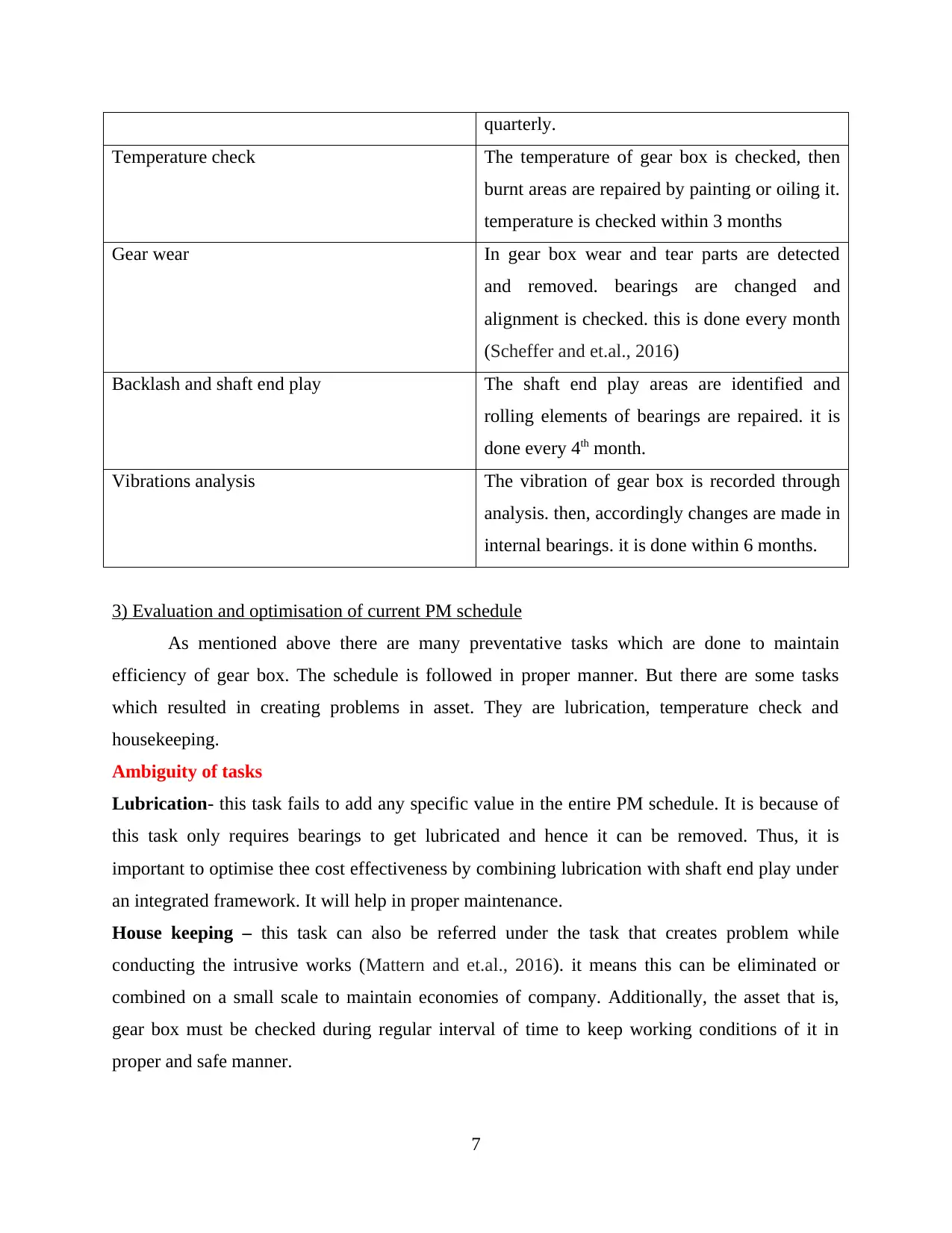
quarterly.
Temperature check The temperature of gear box is checked, then
burnt areas are repaired by painting or oiling it.
temperature is checked within 3 months
Gear wear In gear box wear and tear parts are detected
and removed. bearings are changed and
alignment is checked. this is done every month
(Scheffer and et.al., 2016)
Backlash and shaft end play The shaft end play areas are identified and
rolling elements of bearings are repaired. it is
done every 4th month.
Vibrations analysis The vibration of gear box is recorded through
analysis. then, accordingly changes are made in
internal bearings. it is done within 6 months.
3) Evaluation and optimisation of current PM schedule
As mentioned above there are many preventative tasks which are done to maintain
efficiency of gear box. The schedule is followed in proper manner. But there are some tasks
which resulted in creating problems in asset. They are lubrication, temperature check and
housekeeping.
Ambiguity of tasks
Lubrication- this task fails to add any specific value in the entire PM schedule. It is because of
this task only requires bearings to get lubricated and hence it can be removed. Thus, it is
important to optimise thee cost effectiveness by combining lubrication with shaft end play under
an integrated framework. It will help in proper maintenance.
House keeping – this task can also be referred under the task that creates problem while
conducting the intrusive works (Mattern and et.al., 2016). it means this can be eliminated or
combined on a small scale to maintain economies of company. Additionally, the asset that is,
gear box must be checked during regular interval of time to keep working conditions of it in
proper and safe manner.
7
Temperature check The temperature of gear box is checked, then
burnt areas are repaired by painting or oiling it.
temperature is checked within 3 months
Gear wear In gear box wear and tear parts are detected
and removed. bearings are changed and
alignment is checked. this is done every month
(Scheffer and et.al., 2016)
Backlash and shaft end play The shaft end play areas are identified and
rolling elements of bearings are repaired. it is
done every 4th month.
Vibrations analysis The vibration of gear box is recorded through
analysis. then, accordingly changes are made in
internal bearings. it is done within 6 months.
3) Evaluation and optimisation of current PM schedule
As mentioned above there are many preventative tasks which are done to maintain
efficiency of gear box. The schedule is followed in proper manner. But there are some tasks
which resulted in creating problems in asset. They are lubrication, temperature check and
housekeeping.
Ambiguity of tasks
Lubrication- this task fails to add any specific value in the entire PM schedule. It is because of
this task only requires bearings to get lubricated and hence it can be removed. Thus, it is
important to optimise thee cost effectiveness by combining lubrication with shaft end play under
an integrated framework. It will help in proper maintenance.
House keeping – this task can also be referred under the task that creates problem while
conducting the intrusive works (Mattern and et.al., 2016). it means this can be eliminated or
combined on a small scale to maintain economies of company. Additionally, the asset that is,
gear box must be checked during regular interval of time to keep working conditions of it in
proper and safe manner.
7
Paraphrase This Document
Need a fresh take? Get an instant paraphrase of this document with our AI Paraphraser
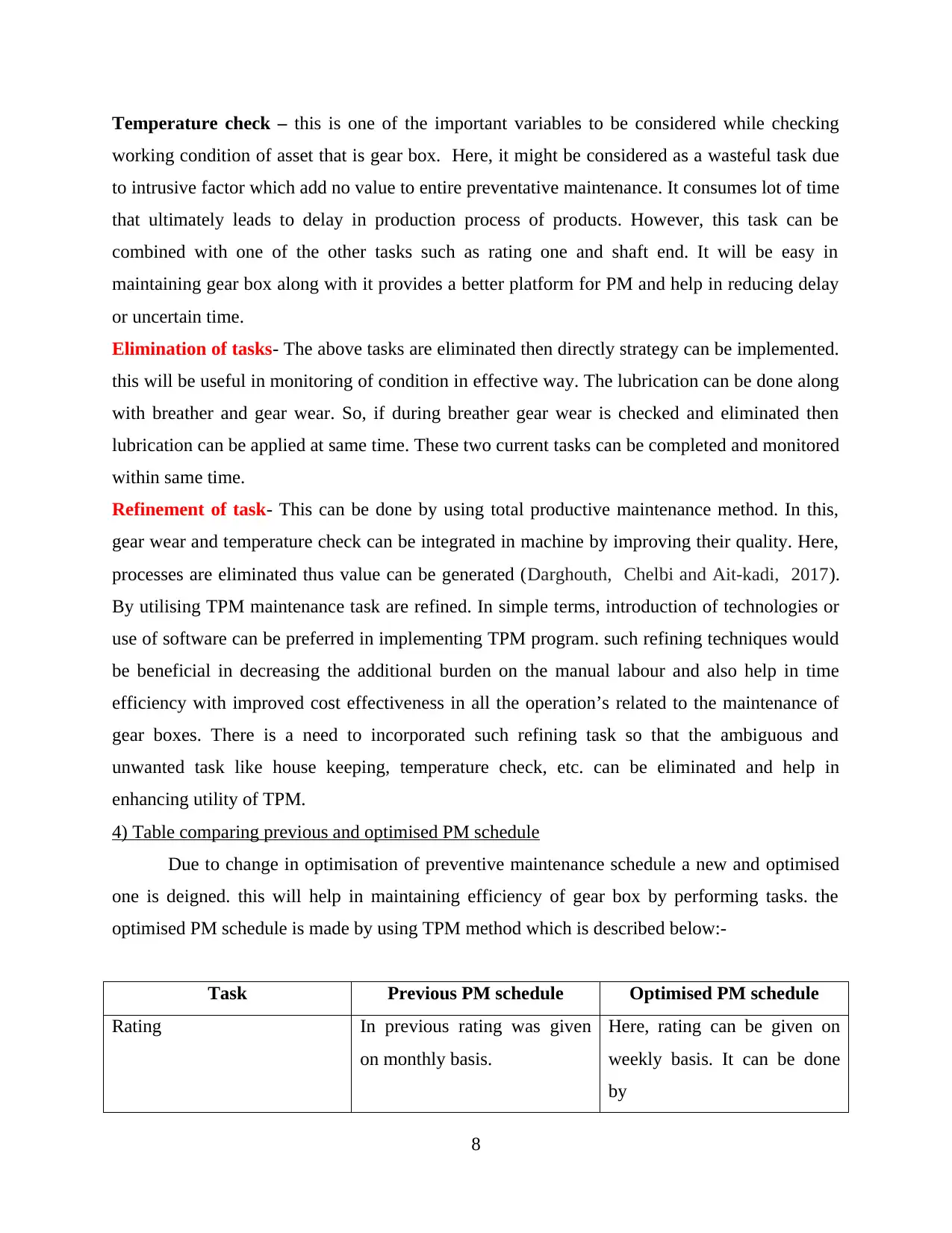
Temperature check – this is one of the important variables to be considered while checking
working condition of asset that is gear box. Here, it might be considered as a wasteful task due
to intrusive factor which add no value to entire preventative maintenance. It consumes lot of time
that ultimately leads to delay in production process of products. However, this task can be
combined with one of the other tasks such as rating one and shaft end. It will be easy in
maintaining gear box along with it provides a better platform for PM and help in reducing delay
or uncertain time.
Elimination of tasks- The above tasks are eliminated then directly strategy can be implemented.
this will be useful in monitoring of condition in effective way. The lubrication can be done along
with breather and gear wear. So, if during breather gear wear is checked and eliminated then
lubrication can be applied at same time. These two current tasks can be completed and monitored
within same time.
Refinement of task- This can be done by using total productive maintenance method. In this,
gear wear and temperature check can be integrated in machine by improving their quality. Here,
processes are eliminated thus value can be generated (Darghouth, Chelbi and Ait-kadi, 2017).
By utilising TPM maintenance task are refined. In simple terms, introduction of technologies or
use of software can be preferred in implementing TPM program. such refining techniques would
be beneficial in decreasing the additional burden on the manual labour and also help in time
efficiency with improved cost effectiveness in all the operation’s related to the maintenance of
gear boxes. There is a need to incorporated such refining task so that the ambiguous and
unwanted task like house keeping, temperature check, etc. can be eliminated and help in
enhancing utility of TPM.
4) Table comparing previous and optimised PM schedule
Due to change in optimisation of preventive maintenance schedule a new and optimised
one is deigned. this will help in maintaining efficiency of gear box by performing tasks. the
optimised PM schedule is made by using TPM method which is described below:-
Task Previous PM schedule Optimised PM schedule
Rating In previous rating was given
on monthly basis.
Here, rating can be given on
weekly basis. It can be done
by
8
working condition of asset that is gear box. Here, it might be considered as a wasteful task due
to intrusive factor which add no value to entire preventative maintenance. It consumes lot of time
that ultimately leads to delay in production process of products. However, this task can be
combined with one of the other tasks such as rating one and shaft end. It will be easy in
maintaining gear box along with it provides a better platform for PM and help in reducing delay
or uncertain time.
Elimination of tasks- The above tasks are eliminated then directly strategy can be implemented.
this will be useful in monitoring of condition in effective way. The lubrication can be done along
with breather and gear wear. So, if during breather gear wear is checked and eliminated then
lubrication can be applied at same time. These two current tasks can be completed and monitored
within same time.
Refinement of task- This can be done by using total productive maintenance method. In this,
gear wear and temperature check can be integrated in machine by improving their quality. Here,
processes are eliminated thus value can be generated (Darghouth, Chelbi and Ait-kadi, 2017).
By utilising TPM maintenance task are refined. In simple terms, introduction of technologies or
use of software can be preferred in implementing TPM program. such refining techniques would
be beneficial in decreasing the additional burden on the manual labour and also help in time
efficiency with improved cost effectiveness in all the operation’s related to the maintenance of
gear boxes. There is a need to incorporated such refining task so that the ambiguous and
unwanted task like house keeping, temperature check, etc. can be eliminated and help in
enhancing utility of TPM.
4) Table comparing previous and optimised PM schedule
Due to change in optimisation of preventive maintenance schedule a new and optimised
one is deigned. this will help in maintaining efficiency of gear box by performing tasks. the
optimised PM schedule is made by using TPM method which is described below:-
Task Previous PM schedule Optimised PM schedule
Rating In previous rating was given
on monthly basis.
Here, rating can be given on
weekly basis. It can be done
by
8
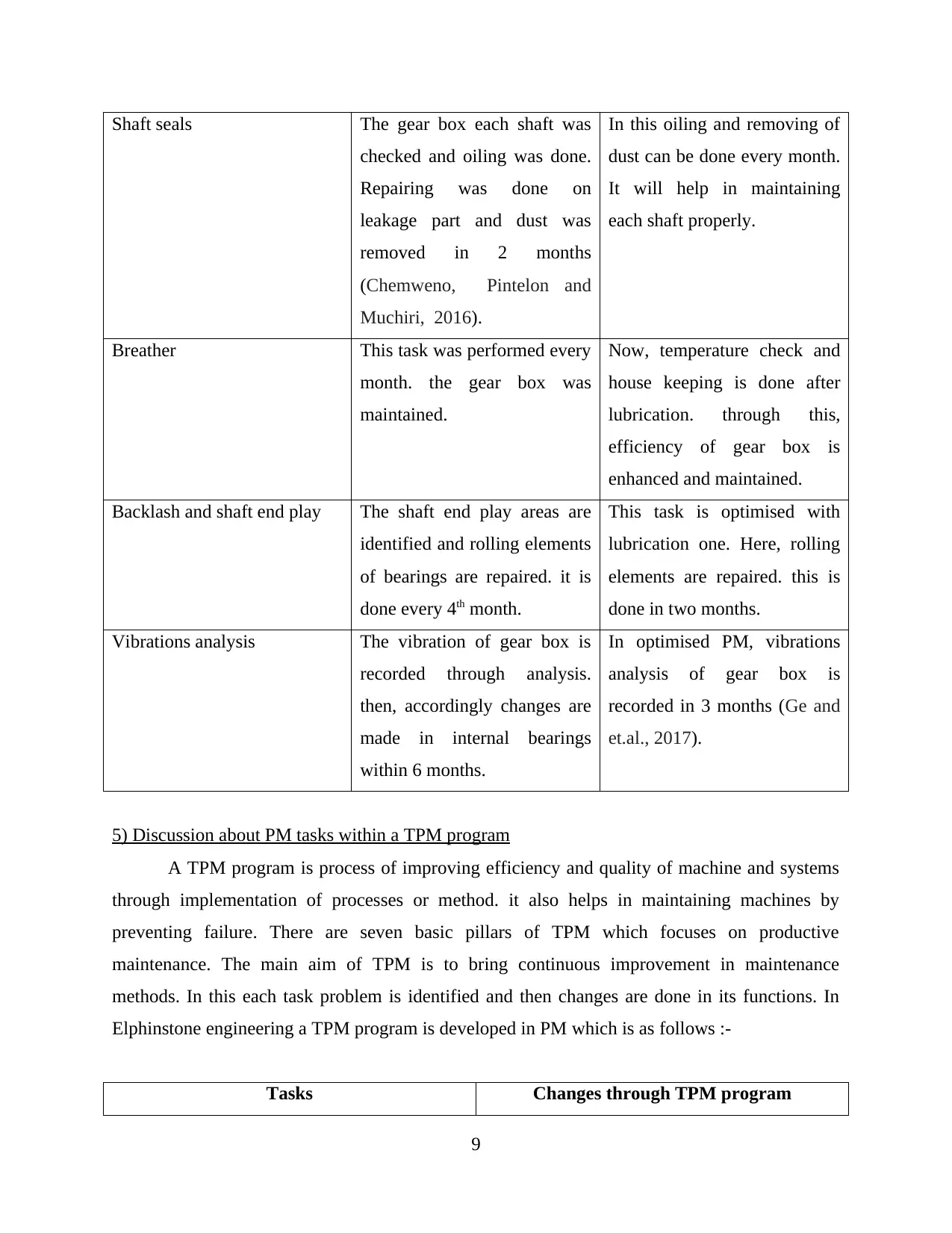
Shaft seals The gear box each shaft was
checked and oiling was done.
Repairing was done on
leakage part and dust was
removed in 2 months
(Chemweno, Pintelon and
Muchiri, 2016).
In this oiling and removing of
dust can be done every month.
It will help in maintaining
each shaft properly.
Breather This task was performed every
month. the gear box was
maintained.
Now, temperature check and
house keeping is done after
lubrication. through this,
efficiency of gear box is
enhanced and maintained.
Backlash and shaft end play The shaft end play areas are
identified and rolling elements
of bearings are repaired. it is
done every 4th month.
This task is optimised with
lubrication one. Here, rolling
elements are repaired. this is
done in two months.
Vibrations analysis The vibration of gear box is
recorded through analysis.
then, accordingly changes are
made in internal bearings
within 6 months.
In optimised PM, vibrations
analysis of gear box is
recorded in 3 months (Ge and
et.al., 2017).
5) Discussion about PM tasks within a TPM program
A TPM program is process of improving efficiency and quality of machine and systems
through implementation of processes or method. it also helps in maintaining machines by
preventing failure. There are seven basic pillars of TPM which focuses on productive
maintenance. The main aim of TPM is to bring continuous improvement in maintenance
methods. In this each task problem is identified and then changes are done in its functions. In
Elphinstone engineering a TPM program is developed in PM which is as follows :-
Tasks Changes through TPM program
9
checked and oiling was done.
Repairing was done on
leakage part and dust was
removed in 2 months
(Chemweno, Pintelon and
Muchiri, 2016).
In this oiling and removing of
dust can be done every month.
It will help in maintaining
each shaft properly.
Breather This task was performed every
month. the gear box was
maintained.
Now, temperature check and
house keeping is done after
lubrication. through this,
efficiency of gear box is
enhanced and maintained.
Backlash and shaft end play The shaft end play areas are
identified and rolling elements
of bearings are repaired. it is
done every 4th month.
This task is optimised with
lubrication one. Here, rolling
elements are repaired. this is
done in two months.
Vibrations analysis The vibration of gear box is
recorded through analysis.
then, accordingly changes are
made in internal bearings
within 6 months.
In optimised PM, vibrations
analysis of gear box is
recorded in 3 months (Ge and
et.al., 2017).
5) Discussion about PM tasks within a TPM program
A TPM program is process of improving efficiency and quality of machine and systems
through implementation of processes or method. it also helps in maintaining machines by
preventing failure. There are seven basic pillars of TPM which focuses on productive
maintenance. The main aim of TPM is to bring continuous improvement in maintenance
methods. In this each task problem is identified and then changes are done in its functions. In
Elphinstone engineering a TPM program is developed in PM which is as follows :-
Tasks Changes through TPM program
9
⊘ This is a preview!⊘
Do you want full access?
Subscribe today to unlock all pages.

Trusted by 1+ million students worldwide
1 out of 21
Related Documents
Your All-in-One AI-Powered Toolkit for Academic Success.
+13062052269
info@desklib.com
Available 24*7 on WhatsApp / Email
![[object Object]](/_next/static/media/star-bottom.7253800d.svg)
Unlock your academic potential
Copyright © 2020–2026 A2Z Services. All Rights Reserved. Developed and managed by ZUCOL.





